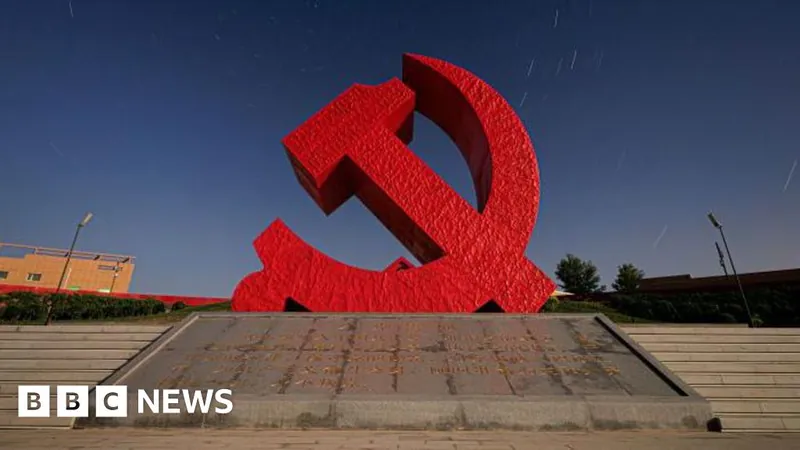
United Front Work: Inside China's Controversial Influence Strategy
2024-12-19
Author: Yan
China's United Front Work Department (UFWD) is often referred to as the country's "magic weapon" of influence, a term coined by its founding leader, Mao Zedong, and echoed by current President Xi Jinping. But what does this mysterious department really do, and why is it provoking alarm among Western powers?
The UFWD, a well-established arm of the Chinese Communist Party (CCP), has recently found itself at the center of several high-profile espionage allegations. Businessman Yang Tengbo, linked to Prince Andrew, is the latest overseas figure to face sanctions due to his connections with the UFWD. While China has strongly denied these espionage claims, asserting they are unfounded, outside scrutiny grows.
Originally conceptualized as a broad coalition among communists, the United Front has evolved, especially under Xi's leadership since 2012. Mareike Ohlberg, a senior fellow at the German Marshall Fund, notes that this strategy aims to "build the broadest possible coalition with all social forces that are relevant." The UFWD's activities are ostensibly transparent, even featuring a website to report its work, yet the true scope and effectiveness of the department remain ambiguous.
The UFWD operates both domestically and internationally, targeting overseas Chinese communities to influence public sentiment regarding sensitive matters, such as China's stance on Taiwan and the treatment of ethnic minorities in regions like Tibet and Xinjiang. It works to shape narratives in the foreign media, actively seeks to undermine critics of the Chinese government abroad, and co-opts influential figures in the Chinese diaspora.
As Audrye Wong, a politics assistant professor at USC, points out, "United Front work can include espionage but is broader than espionage." The Chinese government has significantly ramped up its influence operations abroad as its global standing has risen. Xi promotes a confrontational diplomatic style known as "wolf warrior" diplomacy, urging overseas Chinese to portray a positive image of their homeland.
The department's reach has led to controversies and scandals, including several cases involving figures accused of using their connections to undermine national security. For instance, in 2022, lawyer Christine Lee was accused of seeking to cultivate relationships within the UK, and the following year, Liang Litang was indicted for relaying information about dissidents to the UFWD. Just recently, Linda Sun, previously an aide in New York's governor’s office, was charged with employing her position to promote Chinese interests in the U.S.
So just how thin is the line separating influence from espionage? Ho-fung Hung, a politics professor at Johns Hopkins University, articulates that Beijing’s operations create a "blurry" boundary, particularly after the introduction of a law in 2017 that compels Chinese nationals and enterprises to cooperate with intelligence activities. The Chinese Ministry of State Security has since disseminated propaganda warning about pervasive foreign spies, fostering an atmosphere of suspicion.
Western nations are grappling with how to address China's assertive influence while maintaining diplomatic and economic ties. Countries such as Australia have responded by enacting foreign interference legislation. In the U.S., visa restrictions have been placed on those involved with UFWD activities. Such measures have been met with ire from Beijing, which claims they complicate international relations and are baseless.
Experts caution that while vigilance against the UFWD's influence is essential, care must be taken to avoid stigmatizing the broader Chinese community. Many ethnic Chinese individuals are not aligned with the CCP and may oppose its actions. Dr. Wong emphasizes the importance of avoiding policies that racially profile this community, which could inadvertently drive these individuals closer to Beijing instead of countering its influence.
As pressure mounts amidst growing concerns about UFWD activities, the challenge for Western governments is twofold: effectively countering actual security threats while fostering a cooperative relationship with the diverse ethnic Chinese populations that reside within their borders. This nuanced approach remains more crucial than ever as political tensions intensify, making the investigation into China's United Front Work a pivotal issue on the global stage.



 Brasil (PT)
Brasil (PT)
 Canada (EN)
Canada (EN)
 Chile (ES)
Chile (ES)
 España (ES)
España (ES)
 France (FR)
France (FR)
 Hong Kong (EN)
Hong Kong (EN)
 Italia (IT)
Italia (IT)
 日本 (JA)
日本 (JA)
 Magyarország (HU)
Magyarország (HU)
 Norge (NO)
Norge (NO)
 Polska (PL)
Polska (PL)
 Schweiz (DE)
Schweiz (DE)
 Singapore (EN)
Singapore (EN)
 Sverige (SV)
Sverige (SV)
 Suomi (FI)
Suomi (FI)
 Türkiye (TR)
Türkiye (TR)